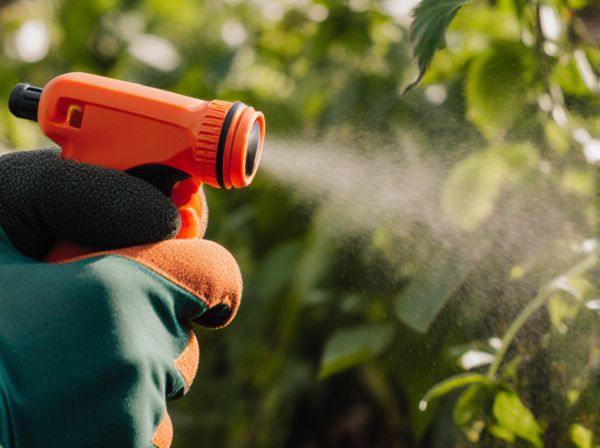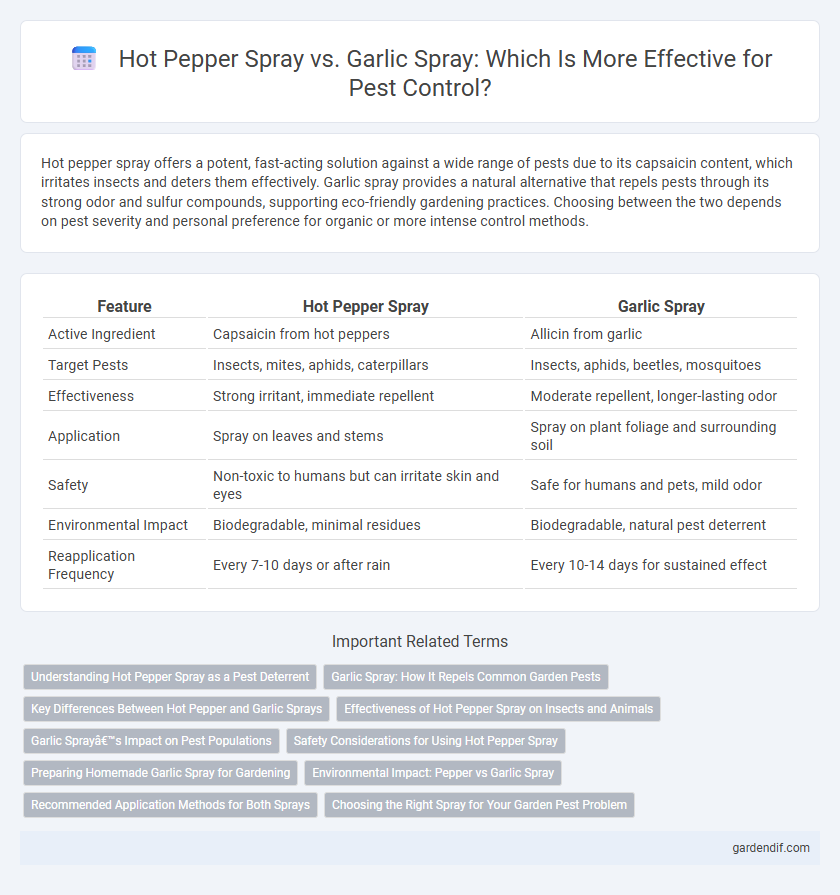
Hot pepper spray vs garlic spray Illustration
Hot pepper spray offers a potent, fast-acting solution against a wide range of pests due to its capsaicin content, which irritates insects and deters them effectively. Garlic spray provides a natural alternative that repels pests through its strong odor and sulfur compounds, supporting eco-friendly gardening practices. Choosing between the two depends on pest severity and personal preference for organic or more intense control methods.
Table of Comparison
| Feature | Hot Pepper Spray | Garlic Spray |
|---|---|---|
| Active Ingredient | Capsaicin from hot peppers | Allicin from garlic |
| Target Pests | Insects, mites, aphids, caterpillars | Insects, aphids, beetles, mosquitoes |
| Effectiveness | Strong irritant, immediate repellent | Moderate repellent, longer-lasting odor |
| Application | Spray on leaves and stems | Spray on plant foliage and surrounding soil |
| Safety | Non-toxic to humans but can irritate skin and eyes | Safe for humans and pets, mild odor |
| Environmental Impact | Biodegradable, minimal residues | Biodegradable, natural pest deterrent |
| Reapplication Frequency | Every 7-10 days or after rain | Every 10-14 days for sustained effect |
Understanding Hot Pepper Spray as a Pest Deterrent
Hot pepper spray acts as an effective pest deterrent by utilizing capsaicin, a natural compound found in chili peppers, which irritates the sensory receptors of insects and animals, discouraging feeding and contact. Its persistent pungency creates an unfavorable environment for pests such as aphids, ants, and deer, without causing long-term harm to plants or beneficial insects. Compared to garlic spray, which relies on sulfur compounds to repel pests, hot pepper spray offers a more targeted and potent defense, especially in gardens vulnerable to larger herbivores and soft-bodied insects.
Garlic Spray: How It Repels Common Garden Pests
Garlic spray repels common garden pests by emitting sulfur compounds that disrupt insect sensory receptors, making plants less attractive to aphids, spider mites, and whiteflies. Its natural antifungal and antibacterial properties protect crops from diseases while reducing reliance on synthetic chemicals. Regular application of garlic spray creates a pest-resistant environment, promoting healthier plant growth and sustainable gardening.
Key Differences Between Hot Pepper and Garlic Sprays
Hot pepper spray contains capsaicin, a compound that causes irritation and repels a wide range of pests by affecting their sensory receptors, while garlic spray relies on sulfur compounds to deter insects through its strong odor and antimicrobial properties. Hot pepper sprays typically provide faster pest repellent effects, whereas garlic sprays offer longer-lasting protection with less risk of plant damage. Both sprays are organic pest control options but differ significantly in their active ingredients, modes of action, and environmental impacts.
Effectiveness of Hot Pepper Spray on Insects and Animals
Hot pepper spray is highly effective in repelling a wide variety of insects and animals due to its active compound capsaicin, which causes irritation and deters pests without causing harm. Studies show that capsaicin disrupts the sensory receptors of pests like aphids, beetles, and deer, making hot pepper spray a natural and eco-friendly pest control solution. Compared to garlic spray, hot pepper spray generally provides quicker and longer-lasting deterrence, especially against larger animals such as rodents and deer.
Garlic Spray’s Impact on Pest Populations
Garlic spray acts as a natural repellent by disrupting the sensory perception of pests, effectively reducing their populations in gardens and crops. Its sulfur compounds create an inhospitable environment for insects such as aphids, caterpillars, and beetles without harming beneficial pollinators. Repeated applications of garlic spray enhance pest management by deterring feeding and reproduction cycles, contributing to sustainable pest control practices.
Safety Considerations for Using Hot Pepper Spray
Hot pepper spray poses a higher risk of skin and eye irritation due to its capsaicin content, requiring users to wear protective gloves and avoid direct inhalation during application. Unlike garlic spray, which is generally considered safer for humans and pets, hot pepper spray should be applied cautiously, especially around children and sensitive vegetation. Proper ventilation and immediate washing of exposed areas minimize adverse reactions and enhance safety when using hot pepper spray for pest control.
Preparing Homemade Garlic Spray for Gardening
Homemade garlic spray acts as a natural pest repellent, effectively deterring aphids, spider mites, and whiteflies without the harmful chemicals found in hot pepper spray. To prepare, blend two whole garlic bulbs with a quart of water, strain the mixture, and add a teaspoon of mild liquid soap to enhance adhesion on plant leaves. This eco-friendly solution offers a safer alternative for organic gardening, promoting healthy plant growth while minimizing environmental impact.
Environmental Impact: Pepper vs Garlic Spray
Hot pepper spray contains capsaicin, a natural compound that degrades quickly in the environment but can cause temporary irritation to non-target animals and beneficial insects. Garlic spray, derived from allicin, is biodegradable and generally safer for pollinators and soil microorganisms, minimizing ecological disruption. Both sprays offer organic pest control options, but garlic spray tends to have a lower environmental footprint due to its targeted action and rapid natural breakdown.
Recommended Application Methods for Both Sprays
Hot pepper spray is best applied as a foliar spray directly onto plant leaves and stems, ensuring thorough coverage to deter pests like aphids and beetles without harming the plant. Garlic spray should be used as a preventive mist around the base and foliage of plants to repel insects such as spider mites and whiteflies, with periodic reapplications after rain for sustained effectiveness. Both sprays should be applied during cooler parts of the day, preferably early morning or late afternoon, to minimize plant stress and maximize pest control efficacy.
Choosing the Right Spray for Your Garden Pest Problem
Hot pepper spray effectively repels aphids, whiteflies, and spider mites due to its capsaicin content, offering a strong deterrent for tough pests. Garlic spray provides a broad-spectrum solution, deterring a variety of insects like beetles and caterpillars with its sulfur compounds and natural odor. Selecting the right spray depends on the specific pest infestation and plant sensitivity, balancing potency with safety for beneficial insects and overall garden health.
Hot pepper spray vs garlic spray Infographic

 gardendif.com
gardendif.com